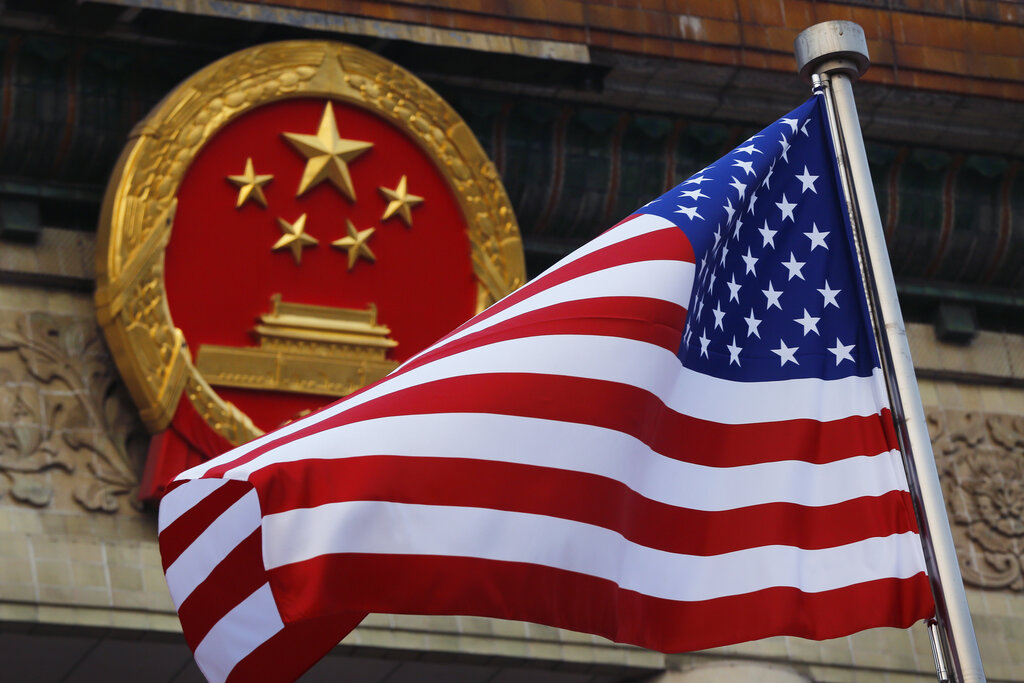Deteriorating relations between America and Communist China are leading some U.S. students and higher education leaders to rethink their presence in the nation’s principal economic rival amid concerns over student safety and a potential decline in enrollment.
Geopolitical tensions are creating the impression that it isn’t safe to study in the People’s Republic, whether through study abroad programs or joint university ventures, the former executive vice chancellor of Duke University’s branch campus at Kunshan, China, Denis Simon, tells the Sun.
“As parents and students and faculty joining these programs see the downward spiral in U.S.-China relations, they wonder, is it safe to go?” Mr. Simon explains.
Fears of what Mr. Simons describes as “a tremendously sharp decline in the numbers of American students who are going to China for study” are prompting administrators to rethink the future of the educational partnership between the two countries.
Harvard moved its summer Chinese language program to Free China, also called Taiwan, “due to a perceived lack of friendliness” by the Chinese host institution, the Beijing Language and Culture University, the Harvard Crimson reported in 2021.
In November, the president of Duke University, Vincent Price, announced at a meeting with faculty and staff that the school must be “clear-eyed” as it considers whether to renew its contract with local partner institution Wuhan University.
Trepidation surrounds the issue of academic freedom on American schools’ satellite campuses in China. “As in all universities in China, the role of the party organization is expanding,” Mr. Simon says. “There’s always a certain level of tension between the Western universities pushing hard on academic freedom and free flow of information and the Chinese policies, which are much more tightly regulated and more restricted.”
A pamphlet produced by the Overseas Security Advisory Council in the U.S. Department of State reminds American students studying abroad in China to “have no expectations of privacy in public or private locations, and be prepared for heightened scrutiny and surveillance.”
The Council warns students that strangers could rope them into “a compromising situation,” that gossip with fellow classmates could be used for “exploitation or blackmail,” and that the content of ostensibly private online communications could contain information that “foreign intelligence operatives … find valuable.”
Chinese law dating to the 1990s regarding international joint ventures requires any foreign academic institution to operate alongside a Chinese counterpart — such as East China Normal University for NYU Shanghai. Chinese law also mandates that a party official must serve on the advisory board of these campuses.
Yet Mr. Simon says that joint educational ventures “are meant to be true partnerships” that merely facilitate interactions between the university administration and relevant Chinese government agencies, such as the Ministry of Education.
The accreditation standard set for these universities provides a mechanism of quality control for academic freedom: “If there were to be a sharp departure from the educational experience, compared to the home campus back in the U.S., the accrediting agency would not be able to accredit the degree,” he argues, adding that to his knowledge, “there have been very few incidents in which academic freedom was really curtailed.”
Yet higher education administrators will need to address the impact of the changing geopolitical environment on university operations abroad. Last month, America warned citizens against visiting China, which also enacted a sweeping foreign relations law aimed at curbing Western influence in the country.
These protectionist policies come amid declining rates of enrollment in educational partnerships between the two countries following the Covid pandemic. At the pandemic’s height, during the 2020-21 academic year, just 382 American college students studied in China, compared with the peak of nearly 15,000 a decade ago.
The pandemic curtailed the number of Chinese students in America, though to a lesser extent. In this same year — the last year for which data is available due to lags in reporting and analysis by the U.S. Department of State — the number of Chinese students in American universities was nearly 318,000, which marked a 14 percent decrease compared to two years prior.
Not unlike American students, Chinese students cite safety concerns as a leading factor determining where to enroll abroad, according to a June study from a Chinese education company, New Oriental Education & Technology Group Inc.
“Universities need to be thinking hard about how they might support their campuses in China if these enrollment challenges persist,” the founder and director of a research initiative on American educational institutions abroad, Global American Higher Education, Kyle Long, tells the Sun.
Mr. Long contends that universities are not a “silver bullet” in easing U.S.-China tensions, but they are “an untapped resource” in pursuing diplomacy. He offers an example: In the 1960s and 1970s, the American University at Cairo provided a sort of “cultural translation” and a window into the motivations between America and Egypt at a moment in which the two countries did not have official diplomatic relations.
Institutions of higher education facilitated cultural and economic exchange between America and China after President Clinton normalized trade relations with the country in 2000. In this spirit of internationalization, Chinese students rapidly emerged as the largest pool of foreign applicants to American universities, and, in turn, many American college leaders identified China as the location for their operations overseas.
College campuses might now be one of the few arenas in which China is willing to play ball with America. “If we want to have a presence in China, we do have to play by their rules a little bit,” Mr. Long argues, concluding that it ultimately benefits American interests to maintain some presence on the ground of our emerging global rival.
Mr. Simon echoes the argument that academic collaboration between young Chinese and American students enables them to develop cross-cultural understanding and communication skills that young people can implement in their careers, whether in business, government, or academia.
Acknowledging the inextricable relationship between these three realms on the international stage, Mr. Simon urges, “we need the next generation of so-called China Watchers.”


